Weekly Thing #229 / Time, Zolatron, Maigret
Hi, I’m Jamie Thingelstad, and this is the Weekly Thing. Isn't that witty? I send this weekly, and it is full of various things. What would I call it if my last name didn’t start with thing? I have no idea!
Good morning! 🌞
The air is brisk and fall colors have officially arrived here in Minnesota. 🍂 I love the cool weather of fall. Campfires are the best this time of year. 🔥
It looks like I got my verbosity level a little high in the links this week, so I’m going to preserve the characters in the intro and keep it short this week.
I hope you have a fabulous week ahead! 😁
The mind is not a vessel to be filled but a fire to be kindled. — Plutarch
Featured
The Battle for the Soul of the Web - The Atlantic
This article hits on a topic that I've pondered at some length. There is an important and vocal effort online focused on a more distributed web. DWeb is a term, but I think IndieWeb is more closely aligned to it. I’m a fan and proponent of this myself. I think anyone that is still actively blogging on their own website is expressing this. It is the opposition movement to the centralization of social media and large corporations hosting all of our personal content.
On the other side you have Web3, which I’m also a fan and proponent of. Web3 has a strong push as well for decentralization. In the IndieWeb community there is a strong focus on hosting your own content, on Web3 the parallel is to manage your own keys and control your assets. Don't rely on others to do it for you. "Not your keys, not your crypto" is the saying.
There is a good amount of alignment between these communities, but ultimately more disagreement. The two areas I see this disagreement are:
- Indieweb is also relatively non-commercial. Indieweb fans do use services, but they tend to rely on smaller services. Sure money is part of the web, but it isn't a focus and people in the Indieweb movement are not looking to get rich. The Web3 space has a price on everything, and sadly has more than I care "crypto bros" just looking to get rich and not doing anything real. Everything having a price seems to push the Indieweb community out. I would suggest that everything having a price is also a way to create a robust and self-sustaining ecosystem.
- The energy usage of Web3 offends many in the Indieweb community. I've seen this myself when talking with friends in Indieweb. On both sides I think this issue gets more about winning and talking points than a real dialogue. Much is shared about crypto's energy usage, but traditional data centers also use a ton of energy. Additionally, the more "indie" style crypto solutions like Gnosis Chain are already incredibly energy efficient, and Ethereum is now post-merge and is energy efficient. So, this point is getting less valid every day, and the tradeoffs are not as simple as many put it.
I think these movements need to come together. A more decentralized, and economically robust web is what we need. There are two sides of the solution right in front of us, but it requires us to shed the marketing terms and get out of tribes to see how it can all work together. Because it absolutely can.
Social media firms ‘monetising misery’, says Molly Russell’s father after inquest | The Guardian
Social media is specifically called out as contributing to the death of 14-year-old Molly Russell.
Molly viewed more than 16,000 pieces of content on Instagram in the six months before she took her own life, of which 2,100 were related to suicide, self-harm and depression. The inquest heard that she compiled a digital pinboard on Pinterest with 469 images related to similar subjects.
Adults are very aware of the numerous problems with social media. Addictive patterns, loss of privacy, and influencing your behavior in ways you may not even realize are just some of them.
But the real tragedy is for teens that are pulled into these circles. Take the complexities of being a teenager, and the greater influence and lack of experience and self-confidence, and add to that the algorithm engines of these sites driving constant engagement with no regard to the content and the outcomes for the child, and we have a profound problem.
The Thorny Problem of Keeping the Internet’s Time | The New Yorker
I’m very familiar with NTP, the Network Time Protocol. In fact, I remember setting up some Unix machines in the mid-90's before NTP was just installed automatically and going through the effort to determine which "strata" of time server I should synchronize with, and how to adjust and manage the local drift of my machines clock. It turns out NTP, and the fact that systems can assume they have a very nearly perfect time, is really important for so many applications. And NTP has done that job for decades.
Now, when I see the New Yorker is writing about Network Time Protocol it raised my interest. This is not glamorous stuff, but the background of the author and the software is a fun read.
N.T.P. works by telling computers to send tiny, time-stamped messages to time-checking devices superior to them in a hierarchy. The hierarchy’s uppermost layer consists of servers that are closely connected to highly accurate clocks kept in tight synchronization with Coördinated Universal Time. The time then trickles, from strata to strata, to the machines at the bottom of the hierarchy, such as ordinary laptops. The protocol tracks the instants that elapse as a time-checking message is sent, received, returned, and received again by its original sender.
Okay, someone needs to fill in the folks at the New Yorker that yes NTP is an acronym, but no you should not write it as "N.T.P." all the time. Lose the periods.
The article is filled with the kind of esoteric details like leap seconds that programmers have to deal with, and most everyone else has no idea even exists. It is also another story of foundational software led by programmers that are now getting very old and unable to maintain the software or the community further. There are a surprising number of projects that have to go through these transitions, and it is often very difficult.

We returned to The Dakota to see The New Standards. We've seen Chan, John, and Steve play there at least a dozen times, and they always give a great show. 🎶
Sep 30, 2022 at 7:25 PM
The Dakota, Minneapolis, MN
Notable
There are three types of meetings.
Interesting taxonomy for meetings, and the conditions that make them work. The "devolution" path is interesting. There are definitely structures here that could be put to work pretty easily.
The High Cost of Living Your Life Online | WIRED
I've been a blogger for over 20 years, so my experience of being online goes back a long way. I can relate to having times where I feel a need to disconnect and make sure I ground myself. Having some part of our lives lived online does create new social and psychological dynamics that we are still trying to understand.
"It’s kind of an adapted hyper-vigilance. As soon as you send something out into the virtual world, you’re sort of sitting on pins and needles waiting for a response," Lembke says. "That alone—that kind of expectancy—is a state of hyperarousal. How will people respond to this? When will they respond? What will they say?"
These feedback loops, that are part of the mechanism social media uses to create addiction, for sure create anxiety. Every time you see a "Like" button it is really a tool to drive machine learning adjustments and create feedback loops to drive more engagement. Personally I've worked hard to disconnect myself from these loops. This is part of the reason I don't track any clicks on the Weekly Thing. First, I don't want to invade your privacy. But I also don't want to "feel bad" because nobody clicked on something. That isn't why I do this, and I don't need or want that information.
I like to think about the idea of "write-only" mode for online activity. Many bloggers operate in "write-only" mode. It is hard in some sense because you intentionally deprive yourself of these feedback loops. But operating in "write-only" also has benefits. It is the opposite of lurking, or "read-only" mode.
maigret: 🕵️♂️ Collect a dossier on a person by username from thousands of sites
This is a very interesting tool that allows you to search hundreds of websites for a given username. I also love that instead of it being built as a website that could be easily blocked, it is a Python package that you run locally. I did a quick pip3 install maigret and ran a scan for thingles, my most common username.
It found me all over the place.
Search by username thingles returned 39 accounts.
Found target's other IDs: dem5f4jv7dx2eb9mc978q7ucnw (yandex_public_id), 76561198286324524 (steam_id).
Search by yandex_public_id dem5f4jv7dx2eb9mc978q7ucnw returned 4 accounts.
Search by steam_id 76561198286324524 returned 3 accounts.
Extended info extracted from 10 accounts.
Countries: us, ru, in, tw, ca, cn, de
Interests (tags): gaming, photo, news, sharing, music, tech, shopping, hobby, stock, streaming, trading, video, messaging, wiki, documents, discussion, reading, writing, finance, coding, maps, forum
Here are the details that it got from just one service, Disqus. Note that maigret did not need authentication to get this. It was able to pull all of this information with just a username.
[+] Disqus: https://disqus.com/thingles
├─id: 5254
├─fullname: thingles
├─disqus_username: thingles
├─reputation: 1.291105
├─reputation_label: Average
├─following_count: 6
├─follower_count: 2
├─location: Minneapolis, MN
├─is_power_contributor: False
├─is_anonymous: False
├─created_at: 2007-12-31T03:19:58
├─upvotes_count: 11
├─website: http://thingelstad.com/
├─forums_count: 2
├─image: https://disqus.com/api/users/avatars/thingles.jpg
├─forums_following_count: 2
├─is_private: True
└─comments_count: 96
Maigret also found a Yandex user with my username. That is a little odd to me. I have never used Yandex, and why did someone grab my rather unique username.
[+] YandexCollections API [Yandex]: https://yandex.ru/collections/api/users/thingles/
├─yandex_public_id: dem5f4jv7dx2eb9mc978q7ucnw
├─fullname: Леся Казакова
Security forensics folks could find this very valuable. I'll keep it around just to monitor my own information, and see what is discoverable.
Sleep Debt: Is It Possible to Catch up On Lost Sleep? - The Pulse Blog
There is some interesting information on Sleep Debt here, but note that it is also a clear pitch for the Oura Ring as well. I've actually had an Oura Ring now for over 6 months and I have been blown away by the sleep metrics that it provides. It is by far the best device that I've ever had for sleep data. Now, I still don't get enough sleep… but at least I’m better informed.
Announcing Turnstile, a user-friendly, privacy-preserving alternative to CAPTCHA
When I first read about some of the Proof of Humanity projects out there I didn’t get it. Honestly it took a bit for me to connect the dots that CAPTCHA really is a Proof of Humanity solution. It is nice to see less intrusive tools to solve this anti-bot problem.
Zolatron 64: Writing an OS for a 6502 homebrew computer - Machina Speculatrix
What an incredibly geeky and delightful project this is. I fondly remember the 6502 in the Apple II and Apple IIe. It was also in the Atari 2600 but I don't think I knew that back then. The Commodore 64 and the original Nintendo also had the 6502. So, you get the era we are talking about.
What I really dig about this project is that he is actually bringing in some new concepts for the OS.
I’ve written before about how I’m using vectors (on memory page 2) to provide hooks allowing user programs in RAM to invoke OS commands in the ROM. I now have about 42 of these. Because I’ve given over all of page 2 to these vectors, and each is two bytes, I have room for 128, which should be enough.
How fun. 🤓
Elon Musk’s Texts Shatter the Myth of the Tech Genius - The Atlantic
I’m not sure there is all that much to learn from going over these text messages, but this comment from Larry Ellison was wild.
In a separate exchange, Musk asks Ellison if he’d like to invest in taking Twitter private. "Yes, of course," Ellison replies. "A billion … or whatever you recommend." Easy enough.
A billion from a text. Wow. 🤯
50 ways to be ridiculously generous — and feel ridiculously good.
What a great sentiment and a great list. I wish I didn’t need reminding of the key point of this article, but I do. Being generous can be incredibly rewarding, and the list of ideas here are a great resource. I noted suggestion 18 "Tip generously". That is one that is super easy to make real.
Sauna use as a lifestyle practice to extend healthspan - ScienceDirect
Long article with a lot of detail, and as a fan of saunas I love to see all the benefits enumerated.
Sauna bathing is associated with many health benefits, from cardiovascular and cognitive health to physical fitness and muscle maintenance. It is generally considered safe for healthy adults and may be safe for special populations with appropriate medical supervision. Heat stress via sauna use elicits hormetic responses driven by molecular mechanisms that protect the body from damage, similar to those elicited by moderate- to vigorous-intensity exercise, and may offer a means to forestall the effects of aging and extend healthspan.
And I just learned there is a "man in a sauna" emoji! 🧖♂️
Dating Other Task Managers
I've been an OmniFocus user since before it was released. It is the power user tool for GTD, and I tend to have a strong view that problems with task managers are more about the person than the tool. Switching task managers is probably one of the most costly things you can do, so I don't even allow myself to really explore other systems. Instead, I can read articles like this to get a flavor for what is out there. Even without exploring the tools you can learn from how other people setup their systems. At the end though Travers states:
Omnifocus
It's always lurking in the shadows. I haven’t touched it properly other than a trial. But it’s there, calling out my name…
The answer is right there… 🤷♂️
An elegy for GNU and RMS | gay robot noises
The world owes a lot to GNU and the Free Software Foundation for all it has made happen. I think we need to support, donate, and help these organizations that have gotten us so far, however, I completely agree with Ash on this point:
There's a saying that generals always fight the previous war. I'm not a military historian, so I can't say how true this is. But I think the FSF is absolutely fighting the free software war of the 80s. The requirement to assign copyright to the FSF for enforcement purposes doesn't make sense in a world where megacorporations that want their own editor they can control have enough resources that they can just write their own. Insisting on not adding functionality because someone evil might use it is pointless when the evil people have enough budget to just write their own compiler.
I've shared previously my own personal story of meeting Stallman in the 90's when I was at the U of MN. He was completely uninformed on the intersection of the Web and Free Software. While the FSF has done great work for Unix, they have been fighting the previous war for decades and desperately need new leadership to determine how this incredibly mission should be represented in the current era of technology.
Journal
State of Blockchain 2022 Event
MN Blockchain hosted their annual State of Blockchain event this evening at Fueled Collective in Downtown Minneapolis. This was the first event of theirs that I have gone to and it was a good evening.
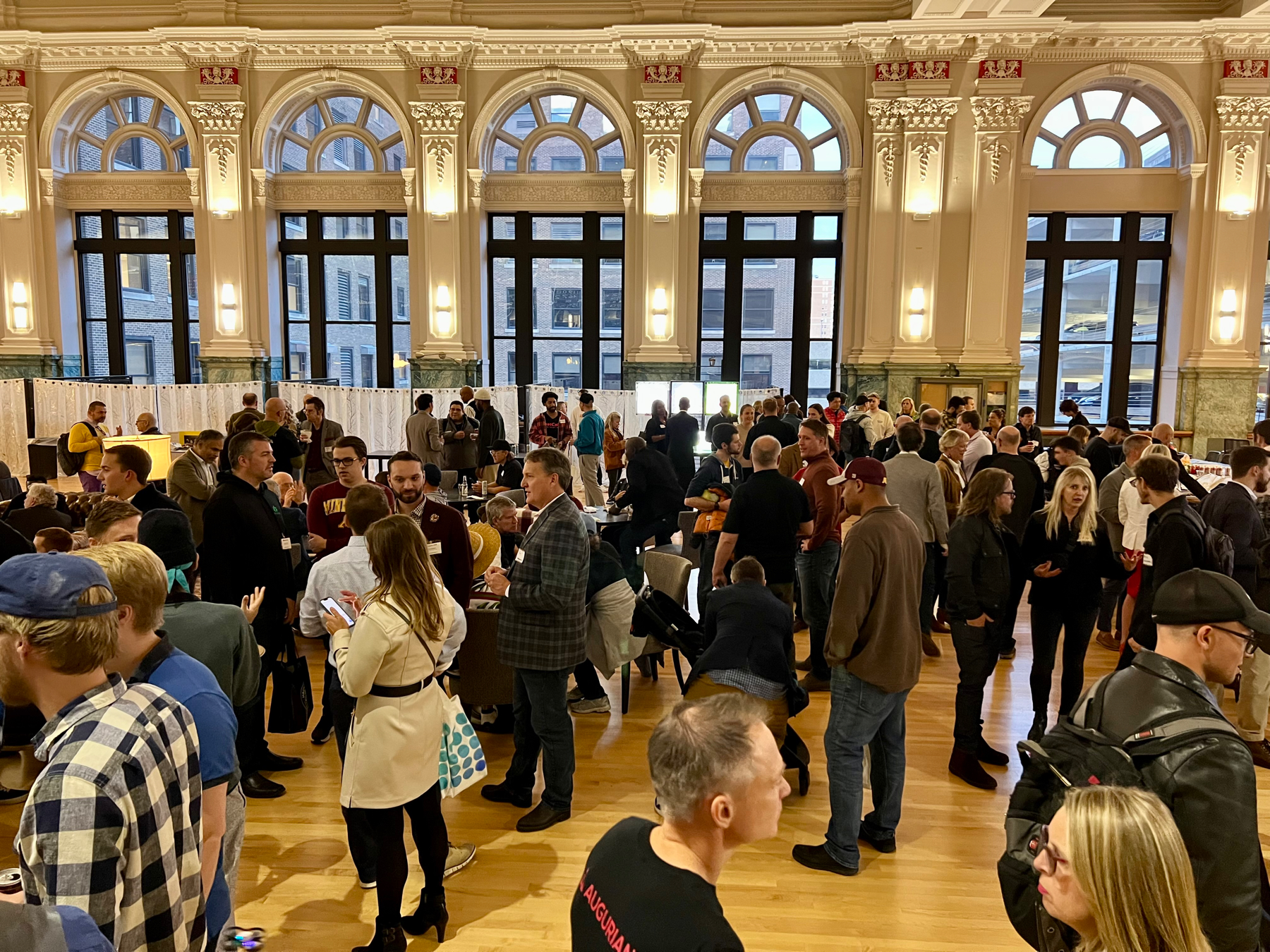
There was an hour for networking and food with a handful of people displaying projects or work they had done. I got to meet Cats Will Eat You, one of the local artists that I have been following for a while. I own Ring, Rang, Rung from him. I also got to check out Inside the Robot and Nuclear Nerds.

For the panels and presenters it started out with storage and the blockchain and a session with Filecoin and StorJ. They are each solving the problem from a different angle with Filecoin more focused on long-term archival and StorJ on distribution and CDN functions. They'll both cross over into each other space.
Disclosure: I am a small investor in a Filecoin provider and hold Filecoin tokens.
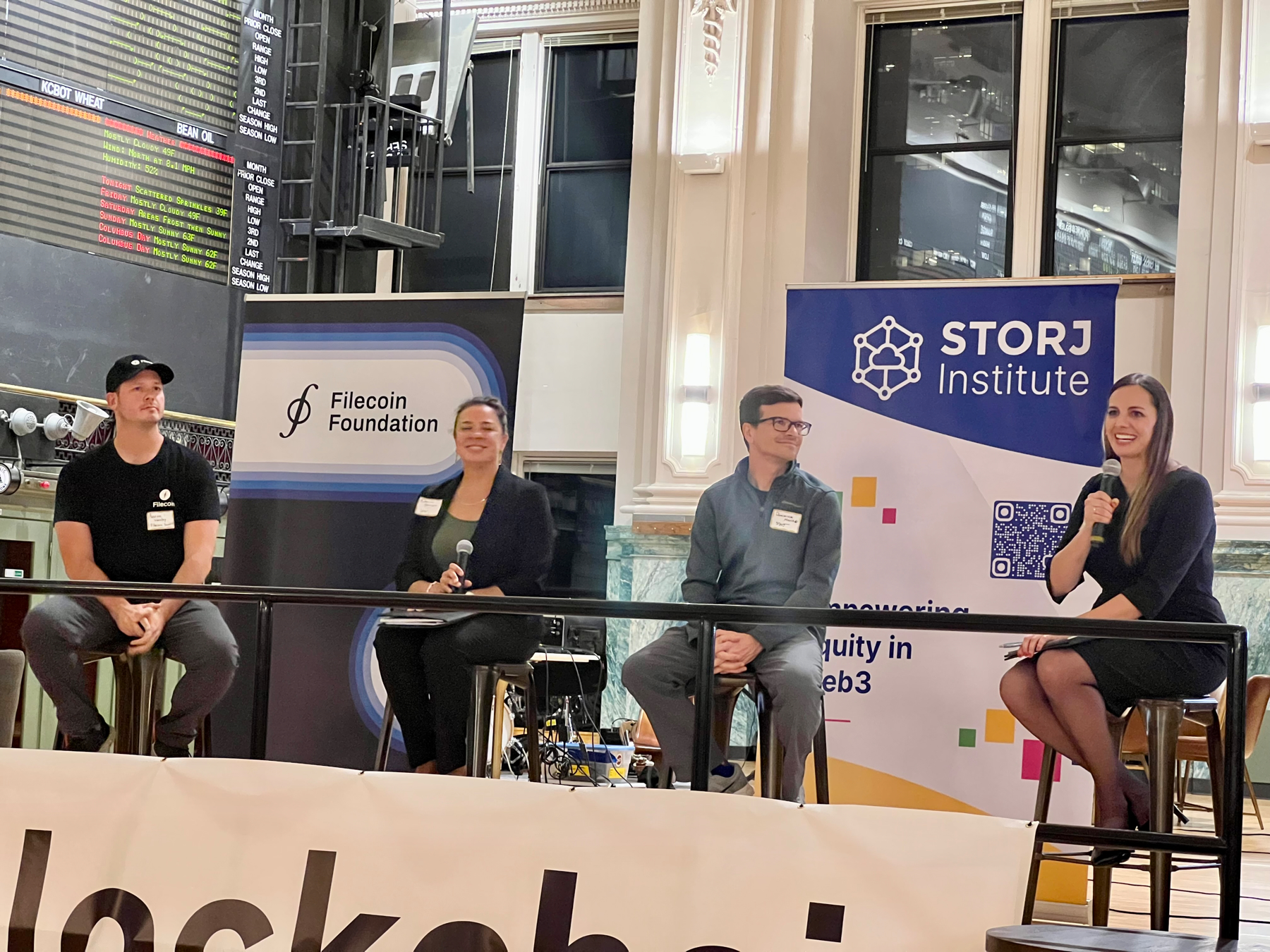
It was really cool to see UMN Blockchain club there. The club has over 300 people engaged and an active community. They won the Columbia University hackathon for crypto.

Another highlight for me was the presentation on using NFTs for campaign fund raising. Not that I’m excited about raising money for campaigns, but I think it is a model of creating community and collective action. The highlight was that the average fund raise from the NFT was $5, but then follow-on donations from those individuals was another $250.
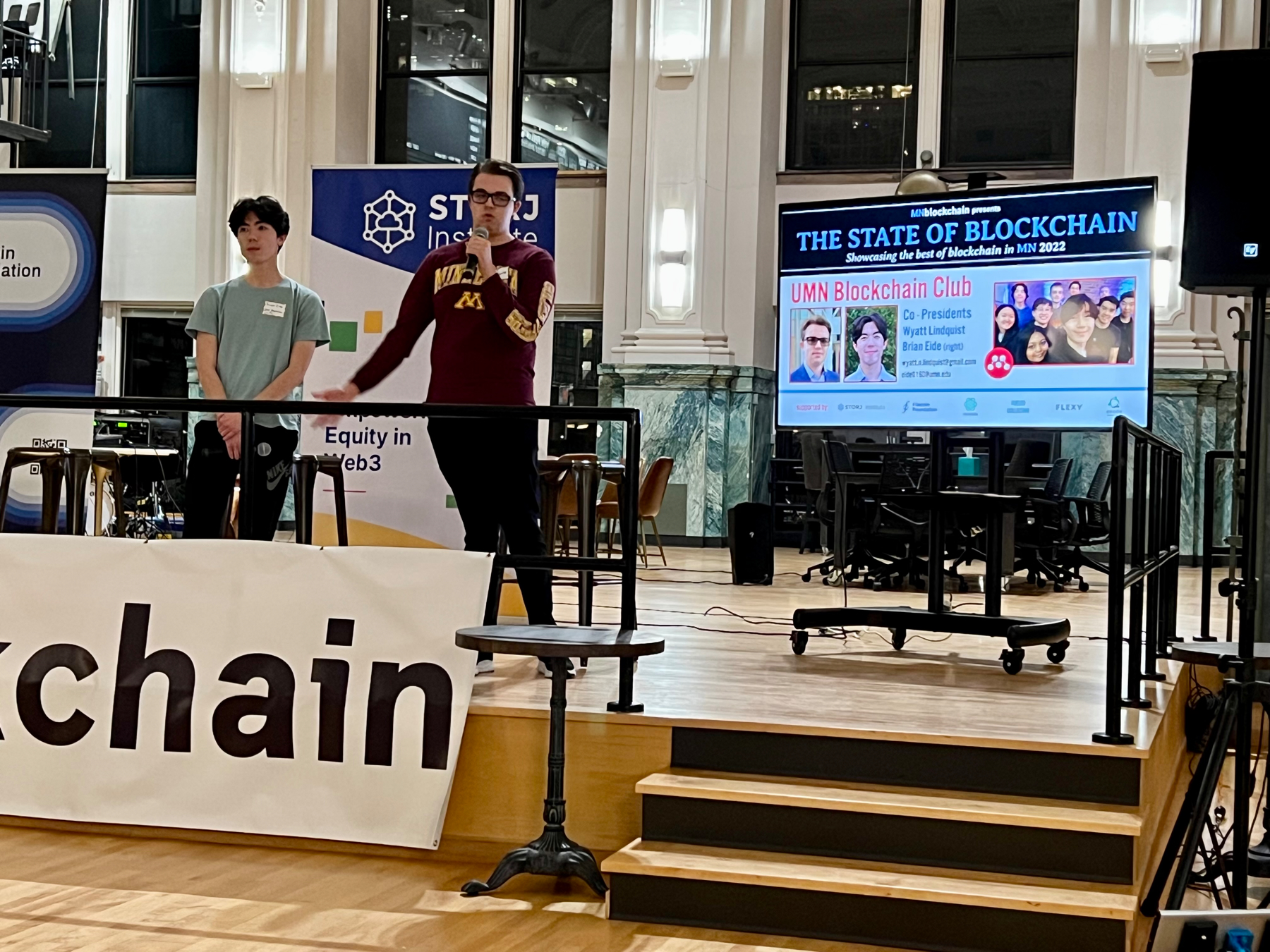
I noted that there wasn't very much overlap between the technology events I typically go to and this one. On the plus side, this event was significantly more diverse on every metric than any tech events I've been to. I loved that. At the same time, I think it is a miss to not get more passionate technologists at these events to stir the creativity and have interesting outcomes.
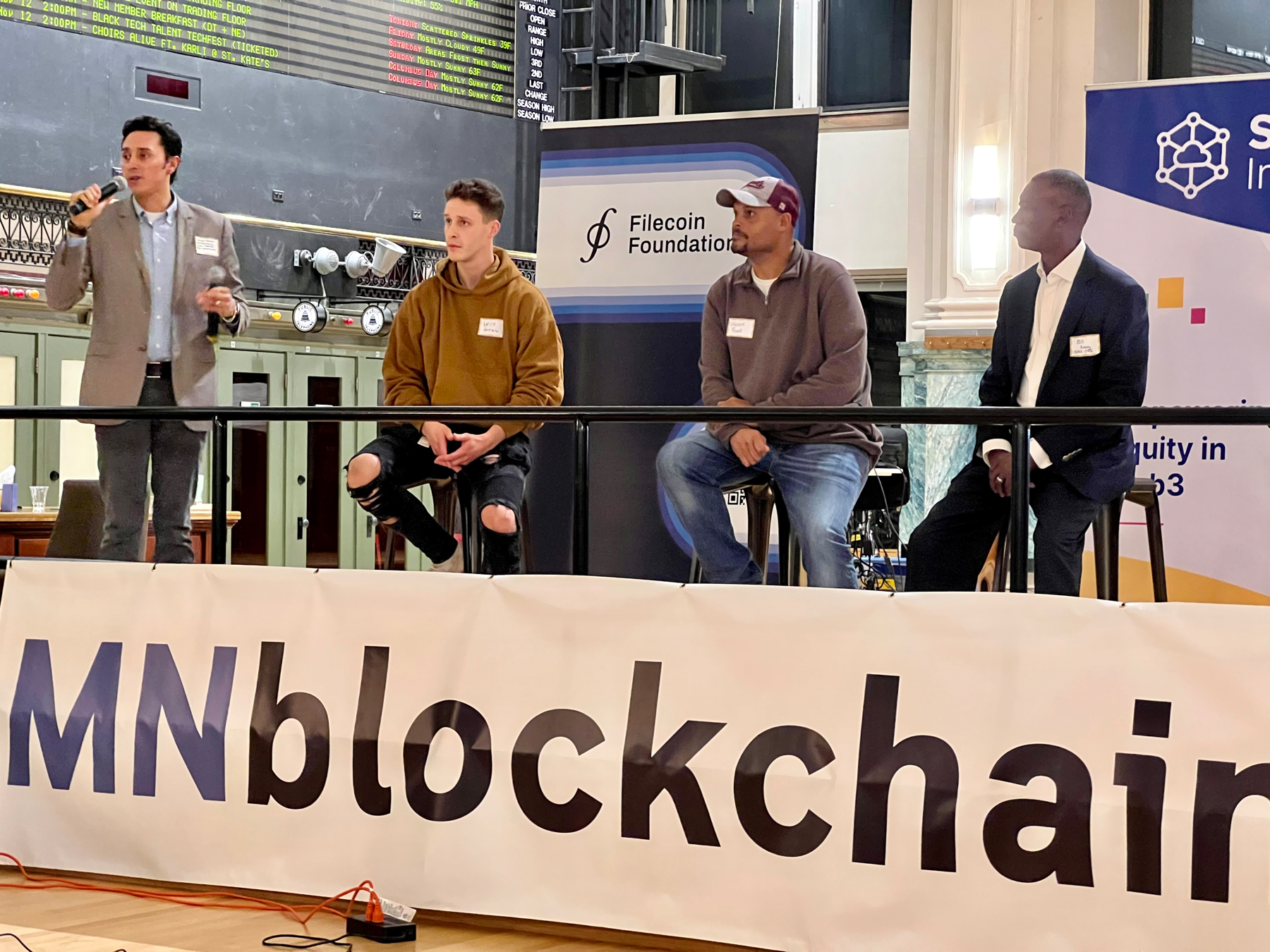
I worked with the organizers to make a POAP for the event, but it was last minute and the distribution was not thought out well enough. More thoughts to come on using POAPs at events. It was also the first time I distributed a "You've met me" POAP, which was fun to do.
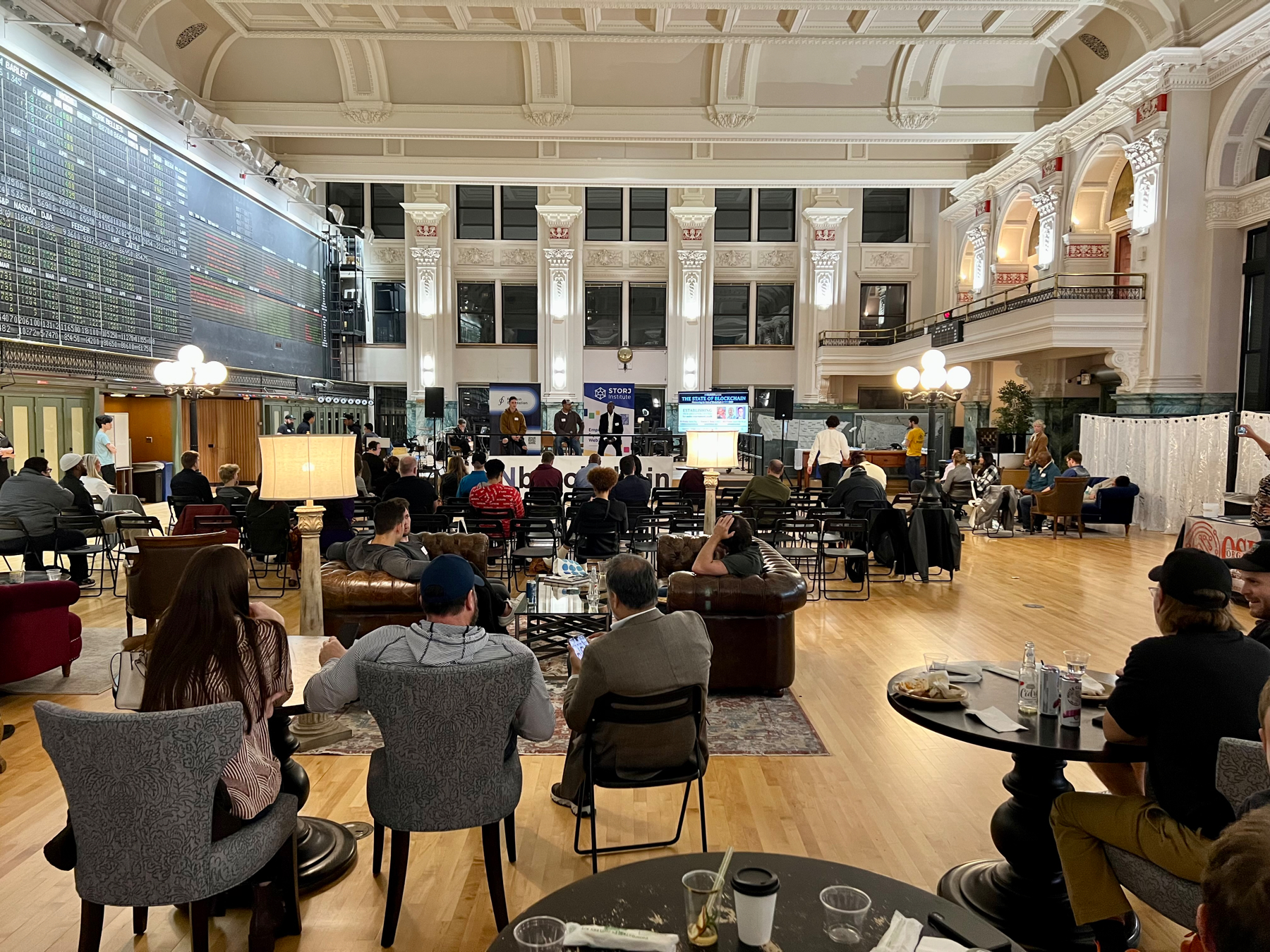
Minted three Peepertoadz (265, 266, 267), a new project based on Cryptoadz by Messhup. Looking forward to the reveal.

So many family and friends around to celebrate with my Mom as she turns over another decade! Wish we could have kept going for a few more hours& 🥰

Grabbed my thingelstad.lilnouns.eth subdomain (transaction) via Lil Domains.
We are having a party to celebrate my Mom's 70th Birthday today and we are marking the day with a special POAP! I used Poapathon to get a wonderful custom image to make it even more special.

My Mom has a big birthday this year and her four sisters and brother all drove from North Dakota today and surprised her at dinner tonight. It was awesome! Tomorrow we have more birthday celebrations!


As the leaves begin to change and the air gets a little crisp, it is a good reminder that Minnesota in the Fall is the best time to listen to The Replacements. The two were made to go together. 🍂🎶

Setting up another 12 Gnosis Chain validators this morning, for a total of 32 when activated.
Based on validators by GC address that means I'm 140th out of 879 validating addresses. My dashboard.
Briefly
Great simple reminders from the book Leadership Two Words at a Time. → 28 Words Every Leader Needs to Thrive - Leadership Freak
I’m still a happy Feedbin customer, but I like a lot of the features of this feed reader, particularly the privacy features. → Miniflux - Minimalist and Opinionated Feed Reader
Handy utility that watches your Ethereum address and notifies you if there are airdrops waiting for you. I used this and found that I had eight different POAPs that I didn’t know where ready for me to claim. → Earnifi | Find Crypto Airdrops
POAP is my favorite crypto app, and this is a cool little utility to make a Twitter banner filled with the various POAPs that you have collected. → poaper.io - POAP Banner Builder
Looking to deploy a GTD system? I can’t imagine a method harder than this one. I know there are many people that love Emacs, but this just seems bonkers. 😳 Now, if there was one for Vim… 😂 → Get Things Done with Emacs
Ukraine seeking NATO membership, and includes the full text of President Zelensky's comments along with it. 🇺🇦 → Zelensky Requested Accelerated Membership to NATO - Kyiv Post - Ukraine's Global Voice
It really shouldn't be this hard to host your own photos on the web. Even great open source solutions like this require a web server, PHP, and a database backend. → Lychee — Self-hosted photo-management done right
Interesting tool that allows you to use SQL syntax to query the configuration information in the cloud, and even join it across multiple cloud datasets. Wild. → Steampipe | select * from cloud;
Fortune
Here is your fortune…
Learn to pause — or nothing worthwhile can catch up to you.
Thank you for subscribing to the Weekly Thing!
Recent Issues
- Weekly Thing #228 / Technical, Adversarial, Overcomplicating
- Weekly Thing #227 / Attention, Minnedemo, Learning
- Weekly Thing #226 / Patagonia, Merge, Walrus
- Weekly Thing #225 / Prestige, WebAssembly, PhizFans
- Weekly Thing #224 / Self, Learning, Identity
About
I once created a wiki to track thousands of global wikis and store the number of users, pages, edit and files over time. It records the extensions used and is the most comprehensive data system of the wiki ecosystem. The project, called WikiApiary, is still being run by people in the MediaWiki team.